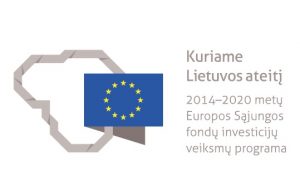„MoBiLait: opening up learning opportunities for people who cannot read regular printed text through the Lithuanian library network (MoBiLait)“, No. 02.3.1-CPVA-V-526-01-0008

Project No. 02.3.1-CPVA-V-526-01-0008
Project title: „MoBiLait: opening up learning opportunities for people who cannot read regular printed text through the Lithuanian library network (MoBiLait)”.
Project duration: from 2018-11-30 to 2021-11-30.
Project implemented by: the Lithuanian Library for the Blind people.
Project partners: Kauno apskrities viešoji biblioteka, Mykolo Romerio universitetas, Vilniaus universitetas, Vytauto Didžiojo universitetas.
Project manager in MRU: Nijolė Liatukienė.
Summary: The aim of the project is to increase the accessibility of services for people who cannot read text in regular format by organising information services and providing them with publications for self-education and study through the network of Lithuanian libraries. Why is this important? According to statistical data, more than 245,000 people in Lithuania are diagnosed with various visual impairments, of whom 160,000 suffer from severe eye diseases, and a significant number of the impairments that prevent a person from being able to read regular text are not diagnosed. Nowadays, a large part of information is communicated through the visual channel, so about 10% of our society has difficulty accessing information. These people cannot read regular printed text and need adapted information in an adapted format. LAB produces and distributes books, periodicals and other information in adapted formats. This information is available to the public at the LAB and at other libraries, as well as through the ELVIS (Electronic Publications Management Information System) virtual library. ELVIS (elvis.labiblioteka.lt) is open to everyone, but only people who cannot read regular text can listen to or download books and other publications in adapted formats. ELVIS currently contains more than 12,600 different information resources: audio books and magazines, publications in DAISY format, descriptions of film soundtracks adapted for people with visual impairments, audio performances and other information. As much as 95% of the adapted books and other publications published by the LAB each year are for the visually impaired (fiction, magazines and newspapers, films). Publications for self-education and scholarship require more effort to produce. This project has been initiated to improve the efficiency of the production process and accessibility of the latter.
Main activities: The MoBiLait project leverages the capacities of LAB and other libraries in the production of adapted formats for informal education and study. To this end, libraries have been equipped with the hardware and software needed for the production of adapted publications, and staff have been equipped with the knowledge and skills to produce these publications.
Result to be achieved: The MoBiLait project also aims to modernise ELVIS, introducing smart information retrieval and access solutions to make ELVIS the main virtual platform for information retrieval and access for people with disabilities. Together with partners, 700 adapted publications in different formats for different readers are planned:
– 100 DAISY (Digital Accessible Information System) publications. This is currently the most modern format for adapted publications and has two undeniable advantages: extremely flexible navigation; synchronisation of printed and readable text in real time. The DAISY edition makes it easy to jump from one place in the book to another (e.g. in the table of contents you can listen to all the titles and then choose which chapter you want to listen to), it makes it easy to mark important or favourite passages and then “turn” to them, it makes it easy to jump to the page you want to turn to, as if you were holding the book in your hands. This is handy when working with several texts at once. The format allows you to adapt the text to the reader’s needs – changing the contrast between text and background, font size. The special value of DAISY is the synchronisation of text and sound, where the text is seen and the same text is heard in parallel, read aloud, and the parts of the text that are read are marked (the colour of the marking can be changed according to the user’s poretous). This is particularly important for people who are visually impaired or dyslexic.
– 400 digital publications adapted for reading with voice synthesis software. These are PDF publications adapted to be read with a synthesiser. The PDFs are “translated by voice” (with the help of text-to-speech software and the Lithuanian Liepa synthesiser). The document itself allows you to navigate freely through the text, to copy quotes, and to specify the page corresponding to the page of a regular printed publication. This format is widely used by visually impaired pupils, students, journalists, scientists, lawyers and others.
– 200 audiobooks, audio recordings of the book read by professional narrators. These books can be downloaded to a person’s device or listened to online, like any other audio recording, a person can control the audio according to his/her needs. For people who cannot read regular printed text, audio books are of great value because they bring back the joy of reading and learning.
The project also aims to modernise ELVIS, to improve the search and accessibility of adapted format publications, to link ELVIS with other national and international electronic publications information systems (e.g. LIBIS, ABC, etc.), in order to make the information on adapted format publications as widely available as possible.
The project is co-financed by the European Regional Development Fund and the State Budget of the Republic of Lithuania, under the implementation measure No. 02.3.1-CPVA-V-526 “Digitisation and dissemination of cultural content”.